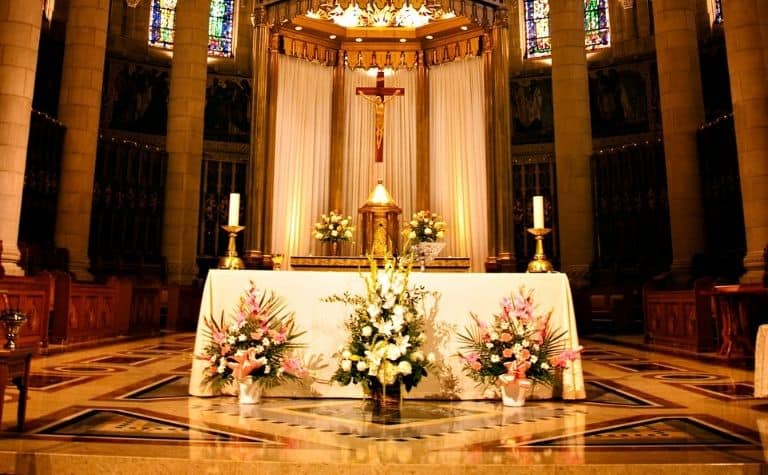Not all church sanctuaries are the same. Some have crucifixes; others have empty crosses. Some have pews; others have chairs. Some have organs; others have drum sets. Some have altars; others don’t.
Presbyterian churches don’t have “altars” like Catholic churches but have “communion tables.” In Catholic churches, the altar holds the elements of the Eucharist and is the center of the Mass. Presbyterian churches observe the Lord’s Supper, but it believes differently about the sacrament.
If the Lord’s Supper is important to Presbyterians, why don’t they celebrate it as Catholics do? How are Presbyterian and Catholic beliefs about the Lord’s Supper different? Keep reading to learn more.
Also, see Presbyterian vs. Pentecostal: What’s the Difference? to learn more.

Communion “Altars” or “Communion Tables”?
In the sanctuaries of Catholic churches, the table that holds the bread and cup is referred to as the altar. The term is taken from biblical descriptions of places where people offered sacrifices, such as Genesis 12:7, “Then the Lord appeared to Abram and said, ‘To your offspring I will give this land.’ So he built there an altar to the Lord, who had appeared to him.” (ESV, emphasis added)
The term “eucharist” comes from the Greek word for “give thanks.” It refers to Jesus’ prayer of thanks when he established the Lord’s Supper (Luke 22:19).
The Eucharist is the centerpiece of the Catholic Mass (or worship service) because it’s “the source and summit of the Christian life,” according to Church teaching. [1]
What is the practical purpose of an altar in a Catholic church? An altar is a raised platform that holds the bread and the cup. A priest consecrates the Eucharist elements on the altar before people partake.
People don’t commonly call the platform a table because the word “altar” is more fitting for the theology of the Eucharist. (Also see How Often Do Presbyterian Churches Take Communion?)
What is the theological reason for calling the platform an “altar”? In the Bible, people performed sacrifices on altars. In Catholic theology, every Eucharist is a re-presentation of Christ’s sacrifice on the cross. However, some non-Catholics, like Presbyterians, don’t believe the Lord’s Supper is a re-presentation of Christ’s sacrifice.
Therefore, “altar” is consistent with Catholic convictions but not with other beliefs about the Lord’s Supper.
Some Presbyterian churches also place the bread and cup for the Lord’s Supper on a raised platform. They don’t call it an “altar” but a “communion table” or something similar. (Also see Presbyterian vs. Anglican: What’s the Difference?)
What Does Presbyterianism Think of Transubstantiation?
The term transubstantiation, which means changed substance, describes the Catholic belief that in the Eucharist, the bread turns into the flesh of Christ, and the cup turns into the blood of Christ.
According to the teaching of the Catholic church, “Transubstantiation means the change of the whole substance of bread into the substance of the Body of Christ and of the whole substance of wine into the substance of his Blood. This change is brought about in the eucharistic prayer through the efficacy of the word of Christ and by the action of the Holy Spirit. However, the outward characteristics of bread and wine, that is the ‘eucharistic species,’ remain unaltered.” [2]
Priests speak eucharistic prayers before people partake of the bread and cup, which includes a prayer of thanks. According to Catholic theology, the bread and cup transubstantiate into the body and blood of Christ during this prayer.
According to the Westminster Confession of Faith, which is the historic belief statement of the Presbyterianism tradition, transubstantiation is “repugnant”:
“That doctrine which maintains a change of the substance of bread and wine, into the substance of Christ’s body and blood (commonly called transubstantiation) by consecration of a priest, or by any other way, is repugnant, not to Scripture alone, but even to common sense, and reason; overthroweth the nature of the sacrament, and hath been, and is, the cause of manifold superstitions; yea, of gross idolatries, (emphasis added; Act 3:21; 1 Cor. 11:24-26; Luke 24:26).” [1]

What Do Presbyterians Believe About Communion?
The Presbyterian tradition doesn’t believe the same things about the Lord’s Supper as the Catholic church does, but that doesn’t imply communion is less important to it. (Also see How Do Presbyterians Worship?)
Communion is a sign and seal: Presbyterians believe that communion is both a sign and a seal. As a sign, communion points the believer to the work that Jesus did on the cross. However, unlike Catholicism, they don’t believe that Jesus is re-sacrificed.
According to the Westminster Confession, “In this sacrament, Christ is not offered up to His Father; nor any real sacrifice made at all, for remission of sins of the quick or dead, (Hbr 9:22, 25-26, 28); but only a commemoration of that one offering up of Himself, by Himself, upon the cross, once for all: and a spiritual oblation of all possible praise unto God, for the same, (1Co 11:24-26; Mat 26:26-27): so that the popish sacrifice of the mass (as they call it) is most abominably injurious to Christ’s one, only sacrifice, the alone propitiation for all the sins of His elect, (Heb. 7:23-24, 27; Heb. 10:11-12, 14, 18). [1]
The core gospel message is of great importance to Presbyterians and those of the Reformed tradition, and the Lord’s Supper serves as an additional reminder of God’s redemptive plan.
One day, Christians will continually feast with the Lord in heaven, and believers get to start this meal on earth in the Lord’s Supper. At its core, communion for orthodox Presbyterians is not an individual event but a communal way for believers to remind each other of Jesus’s sacrifice. (Also see Can Presbyterians Take Catholic Communion?)
Communion also serves as a seal for believers by confirming their salvation and sustaining them through their Christian journey. Traditionally, Presbyterians have recognized only two sacraments: baptism and the Lord’s Supper. Baptism initiates an individual into the covenant of faith.
Communion follows baptism and gives believers the strength to face each day. As a sacrament, communion gives the believer a special application of God’s grace.
However, Presbyterians stress the importance of always pairing the practice of communion with the preaching of the Word. Therefore, the Lord’s Supper should continue the faithful presentation of the gospel message throughout the service.
John Calvin wrote in The Institutes of the Christian Religion that the Lord’s Supper is, “an outward sign by which the Lord seals on our consciences the promises of his good will toward us in order to sustain the weakness of our faith. And we in turn attest our piety toward him in the presence of the Lord and of his angels and before men.” (John Calvin, Institutes of the Christian Religion, 4.14.1, 2:1277)

Communion in the Presbyterian Church USA
Communion serves as an essential element of the Presbyterian worship service. The Presbyterian Church USA, the largest Presbyterian denomination in the United States with around 1,300,000 members, specifies that communion should be a regular part of the Sunday service. However, the denomination concedes that some circumstances may make this impossible. (Also see The Largest Denominations in America: The Top 100)
Communion in the Presbyterian Church of America
The second-largest Presbyterian denomination in the United States, the Presbyterian Church in America, merely stipulates that churches should observe the Lord’s Supper frequently as often as the ruling elders specify. Regardless, communion is an essential practice in the Presbyterian church. [2] [3]
References:
[1] Source
[2] Source
[3] Source
Related Questions
Presbyterian and Pentecostal traditions are two of Protestant Christianity's most important and influential branches. While they agree on several essential biblical doctrines, they differ on certain...
The Roman Catholic and Presbyterian branches of the Christian faith trace their origins to Jesus of Nazareth and his apostles, as well as their writings that comprise most of the New Testament. There...
